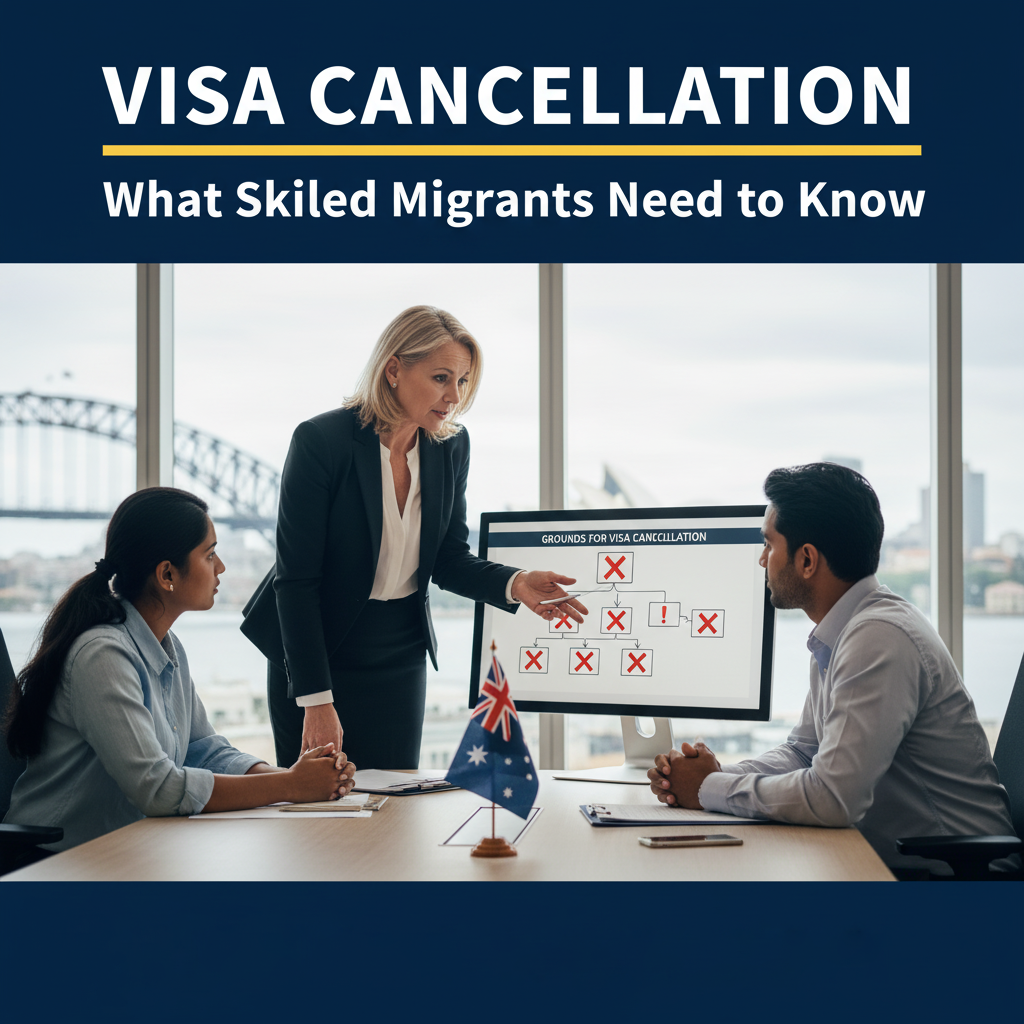Learn key reasons for visa cancellation, your rights, and how skilled migrants can respond or appeal to protect their Australian visa status.
Introduction
In 2024, thousands of skilled migrants in Australia face visa cancellations, often without fully understanding the process or their rights. Visa cancellation can have severe consequences, including detention or deportation. This article explores visa cancellation skilled migrants need to know, including common reasons, the cancellation process, appeal options, and practical strategies to safeguard your visa.
Common Reasons for Skilled Visa Cancellation
Australia’s immigration system enforces strict Australian visa cancellation rules to protect its integrity. Skilled migrants risk cancellation if they breach visa conditions or fail to meet legal requirements. Common skilled visa cancellation reasons include:
- Non-compliance with Visa Conditions: Working beyond permitted hours, failing to maintain health insurance, or not notifying address changes.
- False or Misleading Information: Providing incorrect details or fraudulent documents during the visa application.
- Character Grounds: Criminal convictions, failure to disclose past offences, or failing the character test under section 501 of the Migration Act.
- Health Grounds: Failing required health checks that pose a public health risk.
- Sponsorship or Nomination Breaches: For employer-sponsored visas like subclass 482, failure to meet sponsorship obligations.
- Consequential Cancellation: When a primary visa holder’s visa is cancelled, dependent visas may also be cancelled automatically.
The Department of Home Affairs typically issues a Notice of Intention to Consider Cancellation (NOICC) before cancelling a visa, providing an opportunity to respond.
The Visa Cancellation Process in Australia
Understanding the visa cancellation process Australia helps skilled migrants respond effectively. The process generally follows these steps:
- Notice of Intention to Consider Cancellation (NOICC):
The Department sends a NOICC explaining the grounds for cancellation and invites the visa holder to respond. If you are in Australia, you usually have 5 working days to reply; if overseas, typically 28 days (sometimes extendable by 5 days). These timeframes are strict and set by law. - Response to NOICC:
You must provide evidence or arguments showing why your visa should not be cancelled. This could include proof of compliance, mitigating circumstances, or explanations addressing the Department’s concerns. - Cancellation Decision:
After reviewing your response, a Delegate of the Minister or the Minister personally decides whether to cancel your visa. Some cancellations, such as those on character grounds, may be mandatory. - Notice of Cancellation:
If cancelled, you receive a formal notice. You may be invited to apply for revocation of the cancellation decision or appeal it.
Mandatory vs. Discretionary Cancellation
- Mandatory Cancellation: Applies in cases like serious criminal convictions, where the law requires visa cancellation without discretion. For example, if you fail the character test under section 501, your visa must be cancelled.
- Discretionary Cancellation: The Department or Minister may consider personal circumstances before deciding. Factors include length of residence, family ties, hardship, or rehabilitation efforts.
Your Rights and Options After Visa Cancellation
Skilled migrants have important visa cancellation rights for migrants:
- Right to Be Notified: Except in some mandatory cases, you must receive a NOICC before cancellation.
- Right to Respond: You can submit evidence or reasons against cancellation within the specified timeframe.
- Right to Appeal: Most cancellation decisions can be appealed to the Administrative Appeals Tribunal (AAT). For character cancellations, appeals must be lodged within 9 days of notification.
- Right to Seek Revocation: You may request the Minister to revoke the cancellation on compassionate or compelling grounds.
- Right to Legal Representation: You can engage migration agents or lawyers to assist with responses and appeals.
Consequences of Skilled Visa Cancellation
The skilled visa cancellation consequences are significant:
- Loss of Visa Status: You may immediately lose the right to live and work in Australia.
- Detention and Removal: Cancellation can lead to immigration detention and deportation.
- Impact on Family: Dependent visas linked to your visa may also be cancelled.
- Future Visa Restrictions: Cancellation may bar you from applying for certain visas or re-entering Australia.
- Financial and Emotional Costs: Legal fees, appeals, and uncertainty can be costly and stressful.
How to Avoid Visa Cancellation as a Skilled Migrant
Preventing cancellation is key. Here’s how to avoid visa cancellation:
- Comply Fully with Visa Conditions: Understand your visa conditions (available via VEVO) and adhere strictly.
- Provide Accurate Information: Always submit truthful and complete documents.
- Maintain Good Character: Avoid criminal activity and disclose any relevant history.
- Respond Promptly to Department Notices: If you receive a NOICC or other correspondence, act quickly.
- Seek Professional Advice: Consult registered migration agents or immigration lawyers for complex cases.
Appealing a Skilled Visa Cancellation Decision
If your visa is cancelled, you may be able to appeal:
- Administrative Appeals Tribunal (AAT):
The AAT reviews most cancellation decisions except those made personally by the Minister. You must lodge an appeal within strict deadlines (often 9 days for character cancellations). - Revocation Requests:
You can apply to the Minister to revoke the cancellation on compassionate or compelling grounds. - Judicial Review:
If the AAT upholds cancellation, you may seek judicial review in the Federal Circuit Court. - Ministerial Intervention:
In exceptional cases, the Minister may intervene to grant a visa despite cancellation.
Legal advice is essential to navigate these options effectively.
Practical Steps if Facing Visa Cancellation
- Read the NOICC Carefully: Understand the reasons and deadlines.
- Gather Evidence: Collect documents that counter the cancellation grounds.
- Respond Timely: Submit a detailed response within the timeframe.
- Consult Experts: Engage a migration lawyer or agent immediately.
- Prepare for Appeal: If cancellation proceeds, prepare your appeal with professional help.
visa cancellation
Visa cancellation poses serious risks for skilled migrants, but understanding the visa cancellation process Australia, your rights, and how to respond can protect your status. Early action, compliance, and professional guidance are your best defenses. If you face cancellation, act quickly to explore appeal or revocation options and safeguard your migration future.


